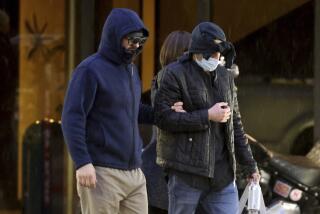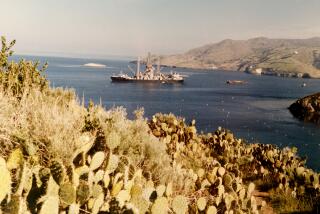Set Up Transoceanic Network : North’s Fiefdom Included Own Air Force and Navy
- Share via
WASHINGTON — Using the wallets of private backers, Lt. Col. Oliver L. North last year ruled a $4.5-million military fiefdom in Central America and elsewhere, including a six-plane air force, one-ship navy, barracks, warehouses, a coded communications system and a Costa Rican airstrip, a presidential commission’s report said Thursday.
The White House panel, headed by former Sen. John Tower (R-Tex.), concluded that North personally directed millions of dollars in private weapons shipments to anti-Sandinista rebels fighting in Nicaragua and that he had planned last fall to transport captured Soviet weapons from Israel to Central America.
The North-directed operations, mostly aimed at propping up the Nicaraguan rebels, were linked to what the former White House official seemed to envision as a transoceanic web of companies and cash-raisers for causes still unknown. The network apparently was to include corporate outposts in Africa and the Middle East as well as the United States and Latin America.
But the panel found no evidence that the operations, which North variously nicknamed “Project Democracy” and “Democracy Inc.,” ever extended beyond already-disclosed aid to the contras and non-military missions related to the arms-for-hostages swaps in Iran.
The panel stated that North himself urged that the network be removed from his control and turned over to the Central Intelligence Agency as soon as a ban on direct U.S. military assistance to the contras had ended last October.
Top CIA officials, including its newly nominated director, Robert M. Gates, were informed of that proposal last summer. But it apparently was abandoned because parts of the network were exposed in September and the rest crashed down after the Iran-contra scandal erupted early last November.
Operations Criticized
The Tower panel bluntly termed those Iran and contra operations “very unprofessional” and stated that North relied on “individuals with questionable credentials and potentially large personal financial interests in the transactions” that the network handled.
“This made the transactions unnecessarily complicated and invited kickbacks and payoffs. This arrangement also dramatically increased the risks that the initiative would leak,” the panel wrote. “Yet no provision was ever made for such an eventuality.”
The panel’s reference apparently was aimed at North’s principal private aides in the Iran-contra operations, retired Air Force Maj. Gen. Richard V. Secord and California-Iranian businessman Albert A. Hakim. The two men ran an arms brokerage company that bought weapons and shipped them to the contras at North’s apparent direction and also arranged air transportation for other weapons drops to the contras in Central America.
Secord and Hakim appear to have helped North manipulate an array of dummy corporations, based in Switzerland and Panama, that funneled money to and helped build North’s “Project Democracy” fiefdom.
Iran Initiative
Although North and the two men ran an extensive--and vastly expensive--military operation in Central America and a less costly Iran arms initiative, the Tower report appears to put to rest reports that the former National Security Council aide was deeply involved in other Third World movements.
Corporate flow charts, NSC computer messages and testimony of North’s White House and CIA companions obtained by the panel suggest that the Marine colonel was so deeply involved in Iran and in propping up the sagging contra movement during 1985 and 1986 that he had little time for other adventures.
Instead, the commission stated, North appears to have channeled millions from private donors, foreign government gifts and--probably--from Iran arms sales “profits” to the “Project Democracy” military machine and to arms shipment to the rebels.
Communicated in Code
From his Washington office, North directed the network through private intermediaries and other government officials, some of whom received encryption devices supplied to North by the National Security Agency.
The report depicts North as virtually immersed in details of the contras’ military struggle in Nicaragua, to the point that he could report in April, 1985, that “$17,145,594 has been expended for arms, munitions, combat operations and support activities” in the preceding 10 months.
‘Direct Operational Role’
And it suggests that North played a “direct operational role” in supplying the contras with arms as early as November, 1985, in a period when Congress had banned direct U.S. military assistance or advice to the rebels.
The Tower panel offers evidence that North had wider ambitions for his secret empire. A carefully drawn chart, included among papers found in North’s files, indicates that North had set up three dummy firms with Swiss bank accounts to act as “collecting companies”--that is, secret repositories for money.
The same chart indicates, with carefully drawn boxes, that North already had a network of dummy firms in Central America--Albon Values Corp., Udall Research Corp. and a newly disclosed firm, Toyco--funneling and spending cash on various “Project Democracy” operations.
Shell Company Listed
But it also includes blank boxes for the Middle East, where only one shell company, Hyde Park Square Corp., is listed as a “treasury” for regional operations. And a section of the chart marked “Africa” is totally blank except for one unfilled box.
The concentration of active firms in Central America suggests that North was focusing almost entirely on that region at the time his network collapsed.
The most compelling evidence of North’s involvement, however, was a memorandum to then-National Security Adviser John M. Poindexter in July, 1986, in which he proposed to sell or surrender his privately financed “Project Democracy” empire to the CIA.
The empire’s assets, all controlled by “overseas companies with no U.S. connection,” totaled $4.5 million, he said. They included six airplanes, “warehouses, supplies, maintenance facilities, ships, boats, leased houses, vehicles, ordnance, munitions, communications equipment and a 6520(-foot) runway on property owned by a PRODEM proprietary.”
North argued that the CIA would secretly reenter the contra war when the ban on U.S. military assistance ended in October, 1986, and that the “Project Democracy” empire would cost $8 million to $10 million to recreate from scratch.
Costa Rica Runway
The runway was actually 6,250 feet long and was situated in northern Costa Rica, near the Nicaragua border. The strip, built in early 1985 as a “tourism and reforestation project,” actually was a landing point for disabled contra supply planes and other secret missions. A barracks and other buildings were erected nearby.
It was shut down by the Costa Rica government in September, 1986, after being exposed in press reports, and the Udall firm was dissolved.
The ‘navy’ was the Erria, a Danish vessel purchased by another “Project Democracy” company named Dolmy Business Inc. in April, 1986, and used on a variety of espionage, gun-running and hostage-rescue missions.
The airplanes included a C-123 transport, purchased by yet another dummy firm with money supplied by still another shell company and operated by Southern Air Transport, a Miami firm with ties to Secord. The C-123 was shot down by Nicaragua in October, effectively ending the secret contra supply airlift. The air fleet also included a Lear jet and a G-3 military cargo plane.
There were also munitions aplenty. In a June, 1986, memorandum, the commission stated, North told Poindexter that there were “several million rounds of most types of ammo on hand and more ($3 M) worth on the way by ship.”
Vague on Finances
The Tower panel, like other investigators, is vague on how the North schemes were financed, although it suggests that far more money was available for his use than has been indicated before.
A flow chart included in the report, prepared by North and seized as evidence, indicates that some money came from U.S. and foreign fund-raising groups managed by Carl R. (Spitz) Channell, a conservative political fund-raiser.
More to Read
Sign up for Essential California
The most important California stories and recommendations in your inbox every morning.
You may occasionally receive promotional content from the Los Angeles Times.












